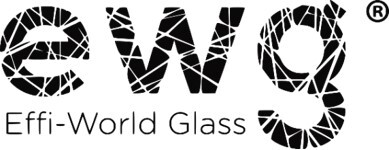Effi-World Glass
New mould concept and materials for glass containers efficiency production- Higher international competitiveness
Challenge
In order to accomplish market needs in glass industry and be able to produce glass containers at competitive prices, high manufacturing rates are required. As a consequence, molds are being submitted to shorter and shorter thermal cycles leading to higher mechanical stresses and, in some cases, to plastic deformation. Therefore, fatigue, oxidation, corrosion, cracking, wear and demolding problems are often occurring inducing premature failure of the molds during service. Furthermore, these problems are responsible for the instability of the production process, the low quality of the manufactured parts and the increase of the maintenance costs. In order to prevent the premature occurrence of such problems, molds have been:
i) Manufactured with high thermal conductivity materials, further improved by channels and fins cooled by compressed air;
ii) Coated with high temperature thermal and mechanical resistant materials;
iii) lubricated (with liquid lubricants) to allow the easy demolding operation.
Although successful improvements have been achieved in the lifetime and production rates of the molds, the above described problems are constantly updated due to either the increasing mechanical loading, to which molds and coatings are submitted, or the use of liquid lubricants inducing molding corrosion and leading to a deficient demolding and defective parts with incorporated debris.
Solution
Main Objective:
To strengthen research, technological development and innovation.
This project aimed to select and develop a new range of materials which will allow to overcome molds problems in glass industry, promoted by either harsh service conditions and liquid lubricants use. The objectives were focused on the simultaneous increase of the lifetime and production rates as well as on the decrease of the maintenance costs. Three research lines were proposed for completing these objectives, as follows:
i) Firstly, based on the intense development of copper-based metallic alloys in last years, replacement of the high thermal conductivity alloys, presently used in molds manufacturing, by state of the art ones with better mechanical and thermal properties is proposed;
ii) secondly, a new mold concept based on bulk materials with better mechanical and thermal properties, associating self lubrication, was developed. The purpose was to develop composite materials, incorporating nanocrystalline diamond, to be applied as a shell on the mold body manufactured with the alloys studied in the previous research line;
iii) finally, the third line of research was focused on the application of a new class of hard coatings with high temperature self-lubricant properties, sputter deposited onto the molding surfaces of the molds manufactured with the alloys previously developed;
The first solution is to have outputs in the short term whereas the other two show a radical innovation change which can contribute to significantly improve the performance of the industrial partners, not only at short but at medium and long terms. The industrial success of the application of these materials allows forecasting important productivity and agility gains which are fundamental for the improvement of the companies’ international competitiveness, either on the production of glass containers or on the manufacturing of molds for the glass industry.
Objectives, Activities and Results expected / achieved
Goals:
i) Selection of alternative materials currently available on the market with better thermal conductivities and mechanical properties, which have allowed, in the short term, to minimize the problems of cracking, oxidation and corrosion of glass packaging molds;
ii) Development of new solid materials and coatings with higher thermal conductivities, better mechanical properties and self-lubricating properties;
iii) Projection of new molds that incorporate the shells of solid materials and the coatings developed within the scope of the project.
Results:
i) Increased lifetime of molding components, not only with materials that are more mechanically resistant to high temperatures, but also with greater thermal conductivities, avoiding the creation of thermal stress and reducing fatigue phenomena and cracking failures;
ii) Introduction of nanocrystalline diamond into selected metal alloys;
iii) Study of the sintering technology that allowed more efficient distribution of diamond particles in the metal alloy structure;
v) Application of thin coatings (without interfering with the mold's thermal conductivity), with mechanical properties several degrees above metallic alloys (for example with hardnesses from 600 to 3000 HV), and with self-lubricating properties at high temperatures that ensure removal of liquid lubricants;
vi) Mold prototypes using bi-component solutions.

Project Reference
POCI-01-0247-FEDER-003376Funding

Intervention Region
Center (100%) of PortugalTotal Investment
1.204.930,18IPN Investment
244.021,54Total Eligible
1.121372,00IPN Eligible
244.021,54EC Funding – Total
683.578,53EC Funding – IPN
183.016,16Duration
39 MonthsStart Date
2015-11-01End Date
2019-01-31Approval Date
2015-10-20Consortium
B.A Vidro S.AINTERMOLDE - Moldes Vidreiros Internacionais, Lda
Instituto Pedro Nunes
Keywords
Glass moulding;Surface Engineering;
Lubrication;
Thin coatings.





